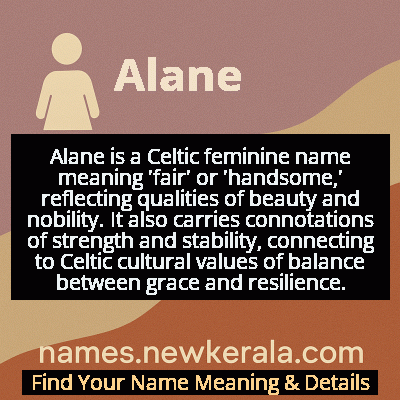Alane Name Meaning & Details
Origin, Popularity, Numerology Analysis & Name Meaning of Alane
Discover the origin, meaning, and cultural significance of the name ALANE. Delve into its historical roots and explore the lasting impact it has had on communities and traditions.
Name
Alane
Gender
Female
Origin
Celtic
Lucky Number
6
Meaning of the Name - Alane
Alane is a Celtic feminine name meaning 'fair' or 'handsome,' reflecting qualities of beauty and nobility. It also carries connotations of strength and stability, connecting to Celtic cultural values of balance between grace and resilience.
Alane - Complete Numerology Analysis
Your Numerology Number
Based on Pythagorean Numerology System
Ruling Planet
Venus
Positive Nature
Harmonious, responsible, caring, and artistic.
Negative Traits
Overly idealistic, superficial, possessive, or jealous.
Lucky Colours
Pink, turquoise.
Lucky Days
Friday.
Lucky Stones
Diamond, turquoise.
Harmony Numbers
2, 3, 9.
Best Suited Professions
Artists, musicians, teachers, healthcare workers.
What People Like About You
Warmth, nurturing nature, artistic flair.
Famous People Named Alane
Alane of Brittany
Religious Figure
Early Breton saint and bishop who helped establish Christianity in Brittany
Alane Chartier
Poet
Breton poet known for lyrical works that blended Celtic and French literary traditions
Alane O'Neill
Academic
Celtic studies scholar who specialized in Breton language preservation
Alane MacLeod
Musician
Contemporary Celtic folk musician known for modern interpretations of traditional Breton music
Name Variations & International Equivalents
Click on blue names to explore their detailed meanings. Gray names with will be available soon.
Cultural & Historical Significance
Throughout medieval times, Alane remained popular among Breton nobility and clergy, serving as a marker of cultural identity distinct from French naming conventions. The name's variations across different Celtic regions—from Brittany to Wales, Scotland, and Ireland—show the interconnectedness of Celtic cultures while maintaining regional distinctiveness in pronunciation and spelling. In modern times, the name continues to symbolize Celtic heritage and serves as a conscious choice for parents seeking to honor their ancestral roots while giving their daughters a name that is both traditional and distinctive.
Extended Personality Analysis
Women named Alane are often perceived as possessing a natural grace and inner strength that reflects the name's Celtic origins. They typically exhibit a balanced combination of traditional values and independent thinking, with a deep appreciation for heritage and family connections. Many Alanes demonstrate remarkable resilience in facing challenges, much like the enduring Celtic cultures from which their name originates. Their 'fair' nature extends beyond physical appearance to include a strong sense of justice and fairness in their dealings with others.
Alanes often possess artistic sensibilities and creative talents, particularly in areas connected to Celtic arts like music, storytelling, or visual arts. They tend to be loyal friends and partners, valuing deep, meaningful relationships over superficial connections. Their personality often blends quiet determination with warm sociability, making them both reliable and approachable. The name's connection to 'rock' symbolism also suggests a foundation of stability and dependability that others find comforting and trustworthy. This combination of grace and strength makes Alanes natural leaders who inspire confidence while maintaining approachability.
Modern Usage & Popularity
In contemporary times, Alane maintains a presence as a distinctive choice that honors Celtic heritage while feeling fresh and uncommon. The name has experienced a modest revival in recent decades, particularly among families with Breton, Welsh, or Scottish ancestry seeking to reconnect with their cultural roots. While not among the most popular names in English-speaking countries, it appears consistently in birth records, especially in regions with strong Celtic cultural connections like Brittany, Cornwall, and parts of Canada with Acadian populations. Modern parents often choose Alane for its elegant sound, cultural significance, and relative rarity compared to more common Celtic names like Fiona or Maeve. The name's spelling with an 'e' at the end has become more prevalent in recent years, distinguishing it from the masculine 'Alan' and emphasizing its feminine qualities while maintaining its traditional Celtic character.
Symbolic & Spiritual Meanings
Symbolically, Alane represents the enduring spirit of Celtic culture and the beauty found in strength and tradition. The dual meanings of 'fair' and 'rock' create a powerful symbolic contrast—suggesting both delicate beauty and unshakable foundation. This combination speaks to the Celtic ideal of balanced character, where external grace is supported by internal fortitude. The name also carries connotations of natural beauty and harmony, reflecting the Celtic reverence for the natural world. As a name that has survived centuries of cultural change, Alane symbolizes cultural continuity and the preservation of identity through naming traditions. It represents the bridge between ancient heritage and modern individuality, making it symbolic of cultural adaptation without loss of essence. The name's connection to early Christian saints in Celtic regions adds a layer of spiritual symbolism, suggesting guidance, protection, and moral integrity that has been passed down through generations.

